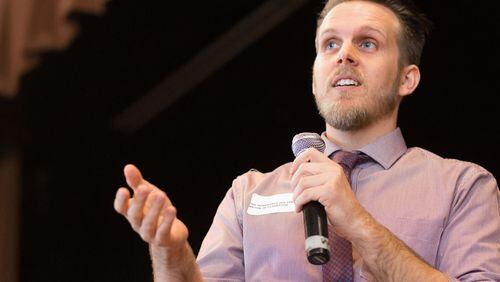One by one, the Syrian refugees climbed onto the stage of the Clarkston Community Center, where they were welcomed to Georgia with warm handshakes, sustained applause and then a huge banquet complete with roasted lamb.
Having fled deprivation and violence in their war-torn nation, the Syrians appeared both relieved and grateful as they stood on the stage and gently caressed their children’s faces. Their little girls wore pink bows in their hair, and their sons wore shiny new tennis shoes. All of them were beaming.
Organized by Syrian-Americans living in the Atlanta area, Saturday’s welcoming event came amid the national debate over whether to block Muslims — including Syrian refugees — from coming to the U.S. following the terrorist massacres in San Bernardino and Paris.
“Let us be proud as Americans for following our age-old tradition of welcoming those who have lost almost everything but have found in our great country a promise for a better tomorrow,” said U.S. Rep. Hank Johnson, D-Lithonia, who was joined at the event by Clarkston Mayor Ted Terry and DeKalb County Public Safety Director Cedric Alexander. “Moreover, let us celebrate the generosity of the American people who have granted to refugees the best gift of all, and that is freedom and hope.”
Humanitarian workers and others sought to find the Syrian refugees jobs, told them how they could get aid and then served them a big Mediterranean-style dinner, including hummus, baba ghanoush and kibbe. Some of the speakers objected to leading presidential candidate Donald Trump’s proposal to bar Muslims from entering the U.S. and efforts by the governors of more than half of all states — including Georgia — to block the resettlement of Syrian refugees.
The governors say they are acting out of cautiousness to protect public safety following the attacks that killed 130 in France last month. The Islamic State group, which has a stronghold in Syria, has claimed responsibility for those attacks. The governors are concerned terrorists could pose as refugees to do harm in the U.S.
“We have taken every effort we can at the state level to try to make sure they do not pose a danger to the citizens of our state,” Georgia Gov. Nathan Deal told reporters this month. “When you have a majority of the American public having grave concerns about a specific group of refugees, the federal government owes it to the people of the country and the people of Georgia to give us more assurances than they have given us to this point.”
Asad Altabchi, a naturalized U.S. citizen from Syria who helped organize Saturday’s event, criticized Deal’s move, while noting that Syria has a long history of welcoming refugees from other nations. Altabchi and other Syrian-Americans have been donating their time and money to help recently arrived Syrian refugees learn English, find work and get clothes, furniture and used cars. He noted that most of the adult male refugee who showed up for Saturday’s event already had jobs.
“Syria never closed a door on refugees,” said Altabchi, a business owner who lives in Newnan. “They welcomed them with open arms.”
Altabchi then welcomed all 12 Syrian refugee families up on to the stage for group photos. Among them was Samer, who fled Syria with his family after the intense fighting killed many of his friends and an uncle and shut down his ironsmith business.
Samer is among more than 2,300 Syrian refugees who have resettled in the U.S. since 2011, when the civil war began. Of those, 69 have relocated to the Atlanta area. President Barack Obama has announced the U.S. will take in 10,000 more displaced Syrians nationwide over the next year.
Samer, who asked that his last name not be published to protect relatives still living in Syria, said he, his wife and his two young sons were thankful for Saturday’s welcoming ceremony.
“I am not scared to live here,” he said through an Arabic interpreter. “I know that around me are a lot of people who care about my family.”
About the Author








